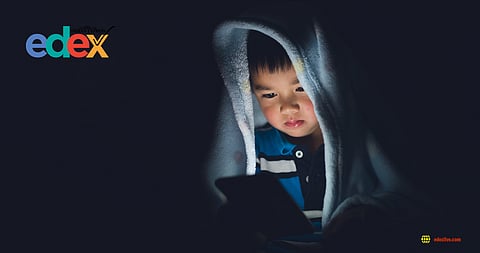

At a busy government vaccination clinic in Kollam, a mother rocks her 18-month-old son on her lap. He squirms and fusses. But no lullaby or toy is forthcoming. Instead, she reaches into her bag and pulls out a smartphone. Instantly, the child goes quiet, eyes locked onto the screen. Around her, other parents follow suit, enacting a silent ritual now woven into everyday parenting in Kerala.
A concerning new study by the Kerala chapter of the Indian Academy of Pediatrics (IAP) reveals that screen exposure among infants and toddlers in the state has reached alarming levels, with nearly 89.1% of children under the age of two regularly using screens.
Despite repeated warnings over the last decade from experts that mobile phones should not be employed to induce children to eat, sleep, or calm down, mobile-fed parenting continues unchecked in many Kerala households. The study was conducted by Dr Manoj Mony, a neonatologist with the Kerala Health Services and Kollam district president of IAP. His research examined children, all below the age of two, who were brought to government health facilities for routine 18-month vaccinations. It also evaluated the socio-demographic backgrounds of families and educational levels of parents to understand how digital exposure takes root in early childhood.
The findings are unequivocal. Infants from families where mothers had only a high-school education showed 100% screen exposure, while children of mothers with PG degrees showed significantly lower exposure, though still high, at 80%. Children in joint-family households showed higher screen exposure (91.5%) compared with nuclear-family households (78.9%). According to Dr Manoj, this likely reflects differences in care dynamics, where shared caregiving and household routines sometimes lead to greater reliance on screens as a distraction.
One of the most worrying find is the use of mobile phones while feeding. Nearly seven in 10 parents reported using screens during feeding time, a habit many assume is harmless but which paediatric experts strongly warn against. The American Academy of Pediatrics recommends zero screen time for kids below 18 months, except for video calls. For children between 18 and 24 months, high-quality content may be introduced, but only with parental participation and supervision. Yet, Kerala’s numbers show the cultural shift toward digital parenting is spreading rapidly, even among educated families who are otherwise aware of health guidelines.
“We are seeing toddlers who are fed on videos, and who cannot eat without watching a screen,” Dr Manoj tells TNIE. “Parents say it is the only way to keep the child calm. But what we are sacrificing is far greater, speech development, emotional bonding, curiosity, social recognition, and fundamental learning through human interaction.”
He described instances where children of parents returning from the Gulf appeared socially withdrawn, made little eye contact, and display language delay -- symptoms many parents feared were early signs of autism. “Parents Google symptoms and panic. They say their child looks ‘autistic.’ But after we stop screens and reintroduce real-world interaction, many of these children drastically improve,” he said. “Autism is a pathological state. But what we are increasingly seeing is screen-induced developmental delay, a preventable social crisis.”
The study was supervised by Dr Jeena from the department of community medicine at Parippally Medical College Hospital. The findings were officially released by Kollam district medical officer Dr M S Anu. It is positioned as a pilot project and calls for a larger statewide initiative to assess digital habits among Kerala’s young children.
